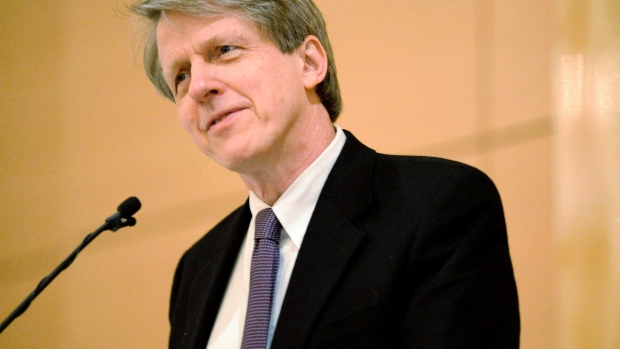May 21, 2018
Yale's Shiller Warns Crypto May Be Another Cincinnati Time Store
, Bloomberg News

(Bloomberg) -- Cryptocurrencies could be the latest case of more than a century’s worth of failed efforts to revolutionize money, according to Robert Shiller, famed for his warnings about the dot-com and housing bubbles.
The Nobel Prize-winning economist compared the euphoria toward almost 2,000 cryptocurrencies created since 2009 to the rise of "time money" in the 1800s.
In 1827, Josiah Warner opened the Cincinnati Time Store, which sold products in hours of work called "labor notes." Two years later, the Welsh textile manufacturer Robert Owen attempted to establish the National Equitable Labour Exchange in London based on "time money." Both experiments failed, and a century later, economist John Pease Norton’s proposal of an "electric dollar" devolved into comedic fodder rather than a monetary innovation.
"No one, outside of computer science departments, can explain how cryptocurrencies work," Shiller wrote in a blog post. "That mystery creates an aura of exclusivity, gives the new money glamour, and fills devotees with revolutionary zeal. None of this is new, and, as with past monetary innovations, a compelling story may not be enough."
While many of the monetary experiments referenced by Shiller failed after a few years, Bitcoin, the largest cryptocurrency, has been around for almost a decade. Its market capitalization has soared to $143 billion from about $30 billion only a year ago, according to CoinMarketCap.
Balaji Srinivasan, chief technology officer at cryptocurrency trading platform Coinbase Inc., wrote in a magazine distributed at the Consensus 2018 industry conference last week that cryptocurrencies are living up to their hype in at least three ways: As a store of value with Bitcoin, as a vehicle to raise capital with initial coin offerings and as a faster way for cross-border transfers.
Schiller is doubling down on his skepticism. In September, he told Quartz that Bitcoin was the best example of a speculative bubble. Calling Bitcoin a bubble isn’t new either: People have been doing that since 2013.
To contact the reporters on this story: Ben Bartenstein in Lima at bbartenstei3@bloomberg.net;Camila Russo in New York at crusso15@bloomberg.net
To contact the editors responsible for this story: Rita Nazareth at rnazareth@bloomberg.net, Alec D.B. McCabe, Peter Millard
©2018 Bloomberg L.P.





